FolkWorld Article by
Walkin' T:-)M:
T:-)M's Night Shift
Folk Songs and Fake Songs from the Delta to the Polka Belt and beyond
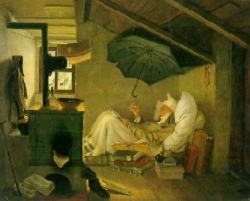 Jetzt ist die Zeit und Stunde da, daß wir ziehn nach Amerika
(the hour of decision is now upon us, for us to go to America),
the Hutterites
sang when leaving behind persecution in the Austrian Empire for a new life in North America.
'The Hutterites are a singing people. Songs acompany all religious and secular events
in the course of a year and of a lifetime,' observed Helmut Wulz. 'Hutterites sing with considerable volume,
and they consciously use a nasal vocal quality that is emphasized through the slutting
of intervals. To justify this style, Hutterites frequently quote the biblical
enjoinment, Let us cry so that the throat breaks.'
Jetzt ist die Zeit und Stunde da, daß wir ziehn nach Amerika
(the hour of decision is now upon us, for us to go to America),
the Hutterites
sang when leaving behind persecution in the Austrian Empire for a new life in North America.
'The Hutterites are a singing people. Songs acompany all religious and secular events
in the course of a year and of a lifetime,' observed Helmut Wulz. 'Hutterites sing with considerable volume,
and they consciously use a nasal vocal quality that is emphasized through the slutting
of intervals. To justify this style, Hutterites frequently quote the biblical
enjoinment, Let us cry so that the throat breaks.'
One of the many Germans and German-speaking groups from Austria, Switzerland, Alsatia
and Bohemia to leave Old Europe for political or economic reasons behind.
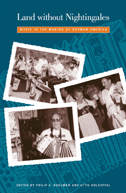 Germantown, Pennsylvania, was settled as early as 1683. But the emigrants had to discover
that America was a Land without Nightingales.
Germantown, Pennsylvania, was settled as early as 1683. But the emigrants had to discover
that America was a Land without Nightingales.
The Americans have no wine, no nightingale! Perhaps they hear their mockingbird in a glass
of apple cider, their dollars jingling in their pockets. These Americans are petty little
shopkeepers. When it comes to any sort of spiritual life, they're totally oblivious.
(Nikolas Lenau, 1832)
The Germans a musical people?
If one searches under the subject heading Germany in just about any library, one
turns up a remarkable number of listings. The two sublistings that predominate in the
American libraries we surveyed were Music and The Holocaust:
composer biographies abound; the Austro-German traition forms the core of a library's
collection of scores and recordings; German historiography and German letters rarely
excludes music in one form or another.
Determind as Germans are, they said to themselves: es ist eine Mission der Deutschen, die Amerikaner
zu lehren, was gute Musik ist (it is a mission of the Germans to teach the Americans
what good music is). The Moravian archives in Bethlehem and Winston-Salem, North Carolina,
hold the most extensive collection of music written and performed in North America before
1825. One Michael Hillegas in Philadelphia was proprietor of America'a first known music
store in the 1750s; John Antes (born 1740) was the first American-born composer of
chamber-music; and the New York Philharmonic Orchestra in 1890 was still 90% German-speaking.
The German concertina, the organ upon you lap, made its new home in the upper
Midwest, from Chicago, the largest city in Burgenland, to the east and northwest.
As recently as the late 1980s concertina clubs could be found. Concertina players
contributed to the sound which became known as polka music, a couple dance which originated
in northwestern Bohemia in the 1830s.
The so-called Polka Belt stretches from Minnesota to Pennsylvania in the East.
An advertisement once read:
An automobile costs a great deal more than a Concertina, and you can't have any more fun
with it. If you buy a Concertina you are making an investment that will pay you high
interest. One player paid off the mortgage on his home, playing on jobs. Buy the
Concertina first and you can earn the price of an auto. A Concertina is a sound
investment in Music, Pleasure, and Profit.
Most famous was Whoopee John Wilfahrt:
Whoopee John Wilfahrt inspired scores of concertinists. Born in 1893 on a farm near New Ulm, Minnesota, Wilfahrt
was of Bohemian German background. Wilfahrt purchased his first of many concertinas from
a neighbor in 1911. The Wilfahrt trio, which had already begun to play for local dances,
expanded to six pieces by the early 1920s. Whoopee John won the admiration of New Ulm
audiences with his repertoire of Old-Country dance tunes and his showmanship on the
concertina: he stretched the bellows to their limit, twirled his instrument, and even
tossed it in the air. His record sales would rival those of pop crooner Bing Crosby in
the late 1930s.
But in the 1890s a nativist movement stressed assimilation to an Anglo-American identity.
During World War I cities and streets that sounded remotely German were renamed,
the governor of Iowa even banned any foreign language in public.
World War I undermined one of the primary emblems of ethnic identification for the club
[Germania Männerchor Evansville, Indiana] - language - and Prohibition undermined
another - social drinking.
German plays were replaced by The Lamasco Minstrels. The choir painted themselves
in blackface and sang the songs of Stephen Foster in English.
In the late 1930s, as sentiment mounted against Adolf Hitler's Nazi regime, the Peters
Brothers fell victim to ugly and preposterous rumors that they were German spies who
exchanged secret information in the housings of concertinas. Whoopee John Wilfahrt was
similarily beleaguered by ludicrous stories suggesting that his band's tours were a cover
for espionage and that his drumming son tapped coded messages to German agents.
Today only a few members [of the Germania Männerchor] speak German. For the most part,
the choirs hold to the practice of singing in German, but the understanding and proper
pronunciation of German song texts present a problem for many singers.
These essays prove that there's more than beer, sausage, and Gemütlichkeit. On the
accompanying CD we can hear Wilfahrt with the standard "Holz-Auktion"
(see here for an version from Berlin group Polkaholix ->
FW#24).
Albert Kolberg (*1912) of Howards Grove, Wisconsin, sings German folksongs that combine with
the blues-yodeling style made famous by Jimmie Rodgers
who had been taught by an emigrant family from Bohemia.
A German not mentioned is John J. Kimmel (1866-1942),
a New Yorker of German Stock who was known as The Irish Dutchman.
Kimmel made the very first melodeon recording of traditional Irish music way back in 1903.
Moreover, he was accompanied by Joe Linder who - unlike many other accompanists of Irish
music at the time - is reported being absolutely familiar with traditional music.
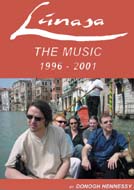 Practically every Irish emigrant melodeon player who came after was striving to emulate
Kimmel's technique. From
Joe Flanagan to
Joe Derrane.
Practically every Irish emigrant melodeon player who came after was striving to emulate
Kimmel's technique. From
Joe Flanagan to
Joe Derrane.
A hundred years later there was much change and development in Irish music. The group
Lunasa
(-> FW#5,FW#12,FW#21,FW#24)
has been hailed as the hottest Irish acoustic group on the planet. Possibly correct.Lunasa feaured at one time or another luminaries like flutists Mike McGoldrick
(-> FW#14,FW#23),
and Kevin Crawford, uilleann pipers John McSherry and Cillian Vallely
(-> FW#24), fiddlers Sean Smyth, guitarist
Donogh Hennessy and bass player Trevor Hutchinson (-> FW#20).
Lunasa - The Music 1996-2001 displays the tunes of the first three records
"Lunasa", "Otherworld", and "The Merry Sisters of Fate".
The tunes are in the same order in which they appear on the discs.
It's a Crock of Gold. Tunes old and new alike. There's more than just jigs and
reels, just as the cover picture shows them boys boating in Venice, there's songs from
Galicia, Britanny, and a Klezmir piece. Each tune is presented as a melody line, along
with chords. However, there are some minor errors. Some sections seemingly are missing;
the music is sometimes hard to read. Hennessy adds chords - he's playing in dropped D
(DADGBD) -, though it's not always exactly what's on the record.
More German traces. "Schwab's" is an old-fashioned general store on Memphis' Beale
Street. Alsatian immigrant Abraham Schwab founded the store in 1876. In the 1990
documentary "Deep Blues," narrator Robert Palmer
starts out at Schwab's and is told that the store used to sell blues 78s and people
poured in, lured by the music playing on the speakers. When the store became overcrowded,
the Schwabs put on church music for a while to thin out the crowd. Down the street is
B.B. King's restaurant, the photography studio where
Robert Johnson reputedly made the
pinstrips-suit photo (one of only two known photos of Johnson), and also long gone
"Pee Wee's" of which W.C. Handy
sang: You'll find that business never closes till somebody gets killed.
In 1999, a sign was installed coming into town: Memphis, Home of the Blues,
Birthplace of Rock 'n' Roll. It is the starting point for Blues Traveling -
The Holy Sites of Delta Blues. Steve Cheseborough
takes you on an arm-chair ride (or bed) that I did enjoy very much.
Leaving Memphis take Highway 61 down south: 61 Highway is the longest road I know;
she run from New York City down to the Gulf of Mexico
(Mississippi Fred McDowell).
Finally to the Mississippi Delta, the the most southern place on earth and the
home of the blues.
Perhaps the first blues traveler in Mississippi was the Harvard archeologist
Charles Peabody, who dug up an Indian mound near Clarksdale in 1901-1902. He looked up
from the ground and took careful note of the local black workers' songs. In the Delta he
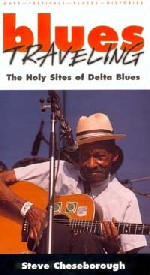 found the richest mine of bluesmen. Though you shouldn't expect a bluesman playing
on every corner - legalized casino gambling on river casinos in 1990 took business away
from jook joints forcing to eliminate live music -, it helps to find what is left in
the Mississippi blues world. Including directions and maps.
found the richest mine of bluesmen. Though you shouldn't expect a bluesman playing
on every corner - legalized casino gambling on river casinos in 1990 took business away
from jook joints forcing to eliminate live music -, it helps to find what is left in
the Mississippi blues world. Including directions and maps.
Holly Ridge:
Charley Patton's
grave marker is near the back of the cemetary and on the far
left, near the gin. The stone reads:
Charley Patton
April 1891-April 28, 1934
"The Voice of the Delta"
The foremost performer of early Mississippi blues
whose songs became cornerstones of America music
Charley Patton is buried in the town where he and Bertha Lee lived for most of the last
two years of his life, 1933 and 1934. They performed at jooks in the area, and especially
in the back of a white-owned store in Holly Ridge. The white store owner sometimes
accompanied him on fiddle. The cemetary contains a lot of hand-engraved stones, though
Patton's, erected in 191 (and financed largely by blues-influenced rock musician
John Fogerty), is modern and professionally done.
Dockery: A state historic marker at the road informs you that the plantation was
Established by Will Dockery in 1895. The plantation once employed Charley Patton, a
legendary blues musician who inspired such greats as
Muddy Waters,
Robert Johnson,
B.B. King and
Elvis Presley.
That last sentence is not exactly correct. None of those four learned directly from
Patton or, probably, ever heard him. A list of wel-known musicians who were strongly
influenced or inspired by Patton would include
Bukka White,
John Lee Hooker and, especially,
Howlin' Wolf,
who learned directly from Patton at Dockery. Dockery's itself was home to up to four
hundred families. Patton would entertain them at occasional outdoor concerts. Dockery's
is mentioned in Patton's 1934 "34 Blues", where he sings, They run me from Will
Dockery's. The song even gives some of the details: Herman told Papa Charley, 'I
don't want you hangin' 'round on my job no more.' Herman Jett was a white Dockery
overseer who ran Patton off, considering him a loafer. He told Patton to quit interfering
with people who were trying to work, and to go get a job. The Dockerys paid no attention
to the music of Patton and their sharecroppers. we were never the type of plantation
owners who invited their help to comein and sing for parties. I wish we had realized that
these people were so important.
There's Parchman Farm, the Mississippi State Pententiary (you can enter the prison grounds
since Highway 32 passes through Parchman):
Sittin' over here on Parchman Farm, ain't ever done no mna no harm...
From its beginning in 1904 until reform finally came in the 1970s, the main purpose of
Mississippi's state farm was not to rehabilitate or even to punish the convicts, but to
make money by growing cotton. It closely resembled an antebellum plantation, with
prisoners replacing slaves. Because the prisoners worked in organized gangs, Parchman
became a kind of preserve for group work songs, which scholars consider an influence on
the blues. Booker T. Washington Bukka White,
an older cousin of B.B. King.
Robert Palmer, told an
interviewer in 1963 that he had been treated better inside Parchman than he often was after
his release. As a musician he had avoided much of the hard work in the prison.
David Kimbrough
told Living Blues, I got down there and I was out there workin' in the
fields, you know, choppin' grass. And so I was singin' and a guad said, 'You need to get
in the Parchman band.' I was always off the farm there with the band. We was gone every
weekend, sometimes whole weeks. You could have your beer or whatever, get you a little
sex or whatever you want to do out there, you know.
Blues places can be quite unholy sites. Many a bluesman was dealing with the devil on
some crossroads. Patton referred to the crossroads in his "1929 Joe Kirby Blues," years
before Robert Johnson. There was no suggestion of anything supernatural, yet a significant
place. In West African religion belief, the crossroads is where one recognizes truth
and makes life-changing decisions
Another Delta bluesman did claim to have made a supernatural deal. That was
Tommy Johnson
(no relation to Robert). Tommy Johnson's brother, LeDell, told researcher David Evans
the exact procedure: He said the reason he knowed so much, said he sold hisself to the
devil. He said, If you want to learn how to play anything you want to play and learn
how to make songs yourself, you take your guitar and you go to where a road crosses that
way, where a crosroad is. Get there, be sure to get there just a little 'fore 12 o'clock
that night so you'll know you'll be there. A big black man will walk up there and take your
guitar, and he'll tune it. And then he'll play a piece and hand it back to you. That's the
way I learned to play anything I want.
But this book does not endorse selling one's soul to the devil to achieve blues mastery,
either as a historical or a practical matter. Stay home and practice instead.
But you can do it like Junior Kimbrough:
My songs, they have just the one chord, there's none of that fancy stuff you hear now,
with lots of chords in one song. If I find another chord I leave it for another song.
The Mamas & The Papas
are certainly not your average folk group. One may argue if it's folk at all but just
clever pop music. Anyway, Go Where You Wanna Go tells the story from the view of
the group members and friends and colleagues.
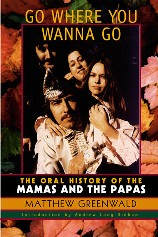 The great songwriting and arranging of John Phillips, the great look of Michelle Phillips,
the voice of Denny Doherty, and the charisma and voice of "Mama" Cass Eliot.
(Barry McGuire) It started 60's-like:
The great songwriting and arranging of John Phillips, the great look of Michelle Phillips,
the voice of Denny Doherty, and the charisma and voice of "Mama" Cass Eliot.
(Barry McGuire) It started 60's-like:
Cass had met Denny, and Denny said, I know this girl that sings wonderfully. We
should have her over and sing with her. We were about to take LSD that night, when
the knock on the door came and Cass came in. So we all had it together the same night,
for the first time, and I think that formed a bond between the four of us that we just
never stopped singing. We just went on and on and on and on.
Well, after the Kingston Trio sort of came in and boosted, not traditional folk music,
but commercial folk music, the whole folk music thing died right after that and just
became persona non grata in the music field. We had resisted going in the pop field for
years and years because you couldn't do anything intelligent in it. We just didn't want
to sing that. The only thing that we could sing was jazz. So we did that. And then when
The Beatles came along and sort of opened this whole new door of songwriting, where you
could express personal feelings. (John)
Folk music changed into folk-rock, and the group penned hits like
"Monday, Monday" and
"California Dreamin'".
We were at the Earle Hotel in New York and Michelle was asleep.
She'd just come from California and all she had was
Californa clothing. And it snowed overnight and in the morning she didn't know what the
white stuff coming out of the sky was. So we went for a walk and the song is mostly a
narrative of what happened that day. I was playing and singing and I thought
California Dreamin' was what we were doing. So I tried to wake Michelle up to write
the lyrics down that I was doing. And she said, Leave me alone. I want to sleep. -
Wake up. Write this down. You'll never regret it. Then she wrote it down and went
back to sleep. And she's told me she's never regretting getting up and writing it down.
Since she gets half of the writing of the song for it. (John)
They were broke. So I talked with Lou [Adler]
and Lou said, Why don't we have 'em sing
background vocals on your album so that they can make a few bucks? I was gonna release
California Dreamin' as my second single. John asked me, Is it okay if we put this
out as our single? And I said, John, it's your song; of course it's okay. They
just took my voice off and put Denny's on, and got Bud Shank to play the flute solo. They
took off my wonderful, moaning harmonica off! And, on the left channel at the very
beginning of the track, you can hear a bit of my vocal. (Barry McGuire)
I was doing a recording session and Bones asked of I could come in and try to put a solo
on a Mamas & Papas record, and I said, Sure. What had happened was that when they
had made the original backing track, they had apparently not lined it up with anything
with firm pitch; it was only guitars, and it was in the cracks. I pulled the head joint
out of my alto flute about an inch, and played it up a half a step, and somehow or another
we lined it up, pitchwise. Now, what evolved out of that was that word got around town
quick that you should always line the pitch up with something like a piano or a tuning
fork. (Bud Shank)
John, Michelle and Lou organised The Monterey Pop Festival,
and John wrote "San Francisco," which
Scott McKenzie recorded.
When Monterey town was frightened by the thought of two hundred and fifty thousand hippies coming,
I got there, I found out that The Who
and Jimi Hendrix were going to play, and then
we were going to close the show. I turned to the stage at exactly the same moment that
Keith Moon held up the victory sign, stood up on his drums, and kicked them over, and they
exploded. It all exploded, as Townshend was putting his guitar through the amplifier. I
disappear down the hole. All of a sudden, this fuckin' racket starts up on stage again!
The feedback is so loud that windows are rattling and light bulbs are popping. I peer my
head out to the stage and Hendrix is lighting his fucking guitar on fire! We came out and
used whatever was left! Who knew I was involved in a fucking milestone? (Denny)
The trip ended after three years, but the four left their legacy and their songs are
still played today.
If you stood in front of them in the studio and listened to them sing, they sounded like
a brass section. These were powerful voices. They were actually seeing stars, from the
oxygen depravation. And they were singin' loud. And why? Because they had come from
singing in folk clubs, where there was maybe one microphone in the whole place, and they
had to blow out to the whole room. (Bones Howe)
There was "The Big Three," Jim Hendricks (not Jimi Hendrix), Tim Rose, and Cass Elliot.
The Big Three was the house band of "The Bitter End"
in New York City's Greenwich Village throughout 1963.
Their music and the couple of albums they made came out about two years before
anybody had thought up the term 'folk rock'. They were accidental folk rock.
The Bitter End, says Kris Kristofferson,
was the Mother Church, run by a guy whose heart was into it and for whom
what hapened on stage was all that mattered. The Bitter End was designed to focus attention
on the artist, and the audiences listened and were hip and responded. It was a magical
place at a magical time. And Paul Colby had the best seat in the house.
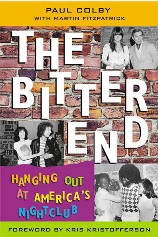 Proprietor Paul Colby tells his tale and it's fun to read:
Proprietor Paul Colby tells his tale and it's fun to read:
In the fifties, folk music replaced poetry. All the things that were not being said in
the newspapers were being discussed in folk music. The real news was coming from poets
who were setting their words to music or singing classics that resonated with meaning.
Then bit by bit espresso stands and cafés started to emerge. To increase business
they would ad entertainment. [Greenwich Village] was like a big H, with Bleecker Street
on the south and West Third Street on the north and MacDougal Street as the bar.
Opening 1961, sooner or later, everybody who was anybody played the Bitter End, from
Muhammad Ali
to Stevie Wonder, and inbetween
Bob Dylan
(-> FW#20),
Ramblin Jack Elliott
(-> FW#23),
Roger McGuinn
(-> FW#23),
Tom Paxton
(FW#20,
FW#24), and
Pete Seeger
(-> FW#20,
FW#21, and this issue).
Billy Joel wrote "Piano Man" after seeing Dylan
at the Bitter End. Dylan was at the piano, his harmonica rack around his neck.
At first Billy wasn't sure what the thing was for. He thought there was something
wrong with Dylan's teeth.
The response to Peter, Paul and Mary wasn't instantaneous. So the Bitter End took out
a ad in the New York Times: I am in no way conected with a club operating under the
name of the Bitter End. But last weekend I saw an act there that I'd just like to tell
you about. You better see this trio before you pay fancy uptown prices. The following
weekend wasn't exactly devastating. The club took out another ad: For all you people
who responded to the idiot who wrote thsi bizarre ad last week, I'd like to apologize to
all the people who came down and were not able to get in. Too many tourists After that
there was no looking back. Peter, Paul and Mary became one of the most emblematic singing
groups of the sixties. By 1962 the Bitter End was established as the country's premier
coffeehouse.
Albert Grossman hung out at the Bitter End all the time. He also had a thing for one of
the waitresses, Sally, whom he would later marry. Sally Grossman has the distinction of
being one of two womwn who ever appeared on a Bob Dylan album cover. She is the
severe-looking brunette on the cover of Bringing It All Back Home. Albert created
Peter, Paul and Mary, and at one time or another he managed Dylan,
Odetta,
the Band,
Paul Butterfield,
Richie Havens,
Ian and Sylvia,
Gordon Lightfoot,
Janis Joplin, and
Dr. John. He was one of the creators of the
Newport Folk Festival and was a guiding force
in insinuating electric music into the world of acoustic music. In 1965, folklorist
Alan Lomax
[-> FW#23] almost gagged when he had to introduce Paul Butterfield and his very electric
Blues Band, Here's a band that's not very original, purely derivative... I guess we'll
just have to put up with them. Albert Grossman went backstage, called Lomax a fucking
idiot, and punched him in the nose. That was the year Dylan went electric and was almost
booed off the stage. Pete Seeger tried to cut the electric cables with an ax.
Later came rock and roll, blues, and jazz. Colby helped founding the
Greenwich Village Folk Music Museum.
Today we live in an age of virtual reality; the sixties may have been the last time when
artist and audience connected by physically touching each other. We fought our causes on
the streets together, marched together, sang together, smoked together, lived and loved
together. Much of that pattern has changed, with one notable exception: the Bitter End.
We still do it the old-fashioned way. For those of you who were too young or not around
yet, we hope it will show you what show business was like and what it could be again.
We're still at 147 Bleecker Street in the heart of Greenwich Village. You should stop
down. You never know who might be hanging out on any given night. Stop down even if it's
just to say hello. I'll be there. I'll be there till the bitter end.
At last, let's change place and sing a song!
I sowed the seeds of love
And I sowed them in the Spring.
I gathered them up in the morning so soon
While the small birds do sweetly sing.
English ballad-singing! O the ridiculous idea!, one George Colman cried out.
To hear a huge fellow with a rough horrible voice roaring out, 'O the roast
beef of old England!' (1762) A hundred years later the situation hadn't improved,
everybody agreed. But 1903 can be
called a turning point for folk music in England. In August that year Cecil Sharp (1859-1924)
sat in the vicarage garden of his friend, outspoken Christian Socialist clergyman Reverend
Charles Marson, at Hambridge in Somerset.
The gardener John England was singing "The Seeds of Love" while mowing the lawn.
Sharp wrote it down, and harmonised and represented the song with piano accompaniment.
He went on to collect songs in Somerset and North Devon, later he even went to the
Southern Appalachians, aware of the survival of British ballads in America. He knew:
There is so little time to be lost. The old singers are dying out rapidly and I shudder
to think of the ruinous effects which a severe winter would have.
While Sharp was emptying his informants, he collected 4,977 tunes.
 He selected folk songs from fake songs with ideas that Vic Gammon calls
romantic nationalism, aestethic Darwinism, and national regeneration,
stretching back to J.G. Herder
who invented the term folk song.
He even campaigned to introduce folk songs into the school curriculum:
He selected folk songs from fake songs with ideas that Vic Gammon calls
romantic nationalism, aestethic Darwinism, and national regeneration,
stretching back to J.G. Herder
who invented the term folk song.
He even campaigned to introduce folk songs into the school curriculum:
If some such scheme as this were adopted not only would the musical taste of the
nation be materially raised, but a beneficent and enduring effect would be produced
upon the national character. For, good music purifies, just as bad music vulgarizes.
The study of the folk-song will also stimulate the growth of the feeling of patriotism.
In 1911 Sharp founded the "English Folk Dance Society,"
which later became the "English Folk Dance & Song Society"
with its headquarters in London named after Cecil Sharp.
One of the contributions that the EFDSS made to the post-1945 folk movement
was the folk festival, starting with the Stratford-upon-Avon Festival in the 1940s.
The Sidmouth Festival
started in 1955 as an EFDSS event for dancers, but was
gradually expanded to include folk song and international dance and music.
Hitherto there is no critical edition of Sharp's manuscripts. Still Growing
is a collection of fifty songs and commemorates the centenary of "The Seeds of Love,"
as sung by John England. Much to discover, though some songs are familiar: "John Barleycorn"
(-> FW#5,
FW#24,
FW#25,
FW#25),
the "Bonny Light Horseman" (-> FW#13),
"Van Dieman's Land" (-> FW#24),
"Paddy Works On the Railway" (-> FW#24),
the "Bonny Bunch of Roses" (-> "FW#23),
the "Dilly Song" better known as "Green Grow the Rushes O" (->
FW#14,FW#23),
and certainly "Still Growing" (-> FW#19").
The book also provides biographical information about the sources and an
introduction defining Sharp's role in the folk music revival.
I like the sentiment
Look at the songs, listen to the old singers, and then make the songs your own.
Sing them as part of your daily life. These songs are not dusty old relics of times
past. They are to be sung today. Remember that we all have a role in ensuring that
they are passed on to new generations of singers. Tradition really is still growing.
Let's sing. Adieu to old England, adieu,... T:-)M.
Bohlman, Philip B., and Otto Holzapfel. Land without Nightingales - Music in the Making of German America.
University of Wisconsin-Madison, 2002, ISBN 0-924119-04-7, 301pp, US$49,95 (CD included).
Cheseborough, Steve. Blues Traveling - The Holy Sites of Delta Blues.
University Press of Mississippi, 2001, ISBN 1-57806-232-2, 235pp, US$18.
Colby, Paul. The Bitter End - Hanging Out at America's Nightclub.
Cooper Square, New York, 2002, ISBN 0-8154-1206-1, 230pp, US$26,95.
Greenwald, Matthew. Go Where You Wanna Go - The Oral History of The Mamas & The Papas.
Cooper Square, New York, 2002, 297pp, ISBN 0-8154-1204-5, US$25,95.
Hennessy, Donogh. Lunasa - The Music 1996-2001.
SGO Ltd., London, 59pp, GB£12.
Roud, Steve et al. (ed). Still Growing - English Traditional Songs and Singers from the Cecil Sharp Collection.
English Folk Dance & Song Society, London, 2003, ISBN 0-85418-187-3, 121pp, GB£12.99.
T:-)M's Night Shift, FW#25
Back to the content of FolkWorld Features
To the content of FolkWorld No. 26
© The Mollis - Editors
of FolkWorld; Published 10/2003
All material published in FolkWorld is © The
Author via FolkWorld. Storage for private use is allowed and welcome. Reviews
and extracts of up to 200 words may be freely quoted and reproduced, if source
and author are acknowledged. For any other reproduction please ask the Editors
for permission. Although any external links from FolkWorld are chosen with greatest
care, FolkWorld and its editors do not take any responsibility for the content
of the linked external websites.
FolkWorld - Home of European Music

Layout & Idea of FolkWorld © The
Mollis - Editors of FolkWorld
 Jetzt ist die Zeit und Stunde da, daß wir ziehn nach Amerika
(the hour of decision is now upon us, for us to go to America),
the Hutterites
sang when leaving behind persecution in the Austrian Empire for a new life in North America.
'The Hutterites are a singing people. Songs acompany all religious and secular events
in the course of a year and of a lifetime,' observed Helmut Wulz. 'Hutterites sing with considerable volume,
and they consciously use a nasal vocal quality that is emphasized through the slutting
of intervals. To justify this style, Hutterites frequently quote the biblical
enjoinment, Let us cry so that the throat breaks.'
Jetzt ist die Zeit und Stunde da, daß wir ziehn nach Amerika
(the hour of decision is now upon us, for us to go to America),
the Hutterites
sang when leaving behind persecution in the Austrian Empire for a new life in North America.
'The Hutterites are a singing people. Songs acompany all religious and secular events
in the course of a year and of a lifetime,' observed Helmut Wulz. 'Hutterites sing with considerable volume,
and they consciously use a nasal vocal quality that is emphasized through the slutting
of intervals. To justify this style, Hutterites frequently quote the biblical
enjoinment, Let us cry so that the throat breaks.'
 Germantown, Pennsylvania, was settled as early as 1683. But the emigrants had to discover
that America was a Land without Nightingales.
Germantown, Pennsylvania, was settled as early as 1683. But the emigrants had to discover
that America was a Land without Nightingales.
 Practically every Irish emigrant melodeon player who came after was striving to emulate
Kimmel's technique. From
Practically every Irish emigrant melodeon player who came after was striving to emulate
Kimmel's technique. From
 found the richest mine of bluesmen. Though you shouldn't expect a bluesman playing
on every corner - legalized casino gambling on river casinos in 1990 took business away
from jook joints forcing to eliminate live music -, it helps to find what is left in
the Mississippi blues world. Including directions and maps.
found the richest mine of bluesmen. Though you shouldn't expect a bluesman playing
on every corner - legalized casino gambling on river casinos in 1990 took business away
from jook joints forcing to eliminate live music -, it helps to find what is left in
the Mississippi blues world. Including directions and maps.
 The great songwriting and arranging of John Phillips, the great look of Michelle Phillips,
the voice of Denny Doherty, and the charisma and voice of "Mama" Cass Eliot.
(Barry McGuire) It started 60's-like:
The great songwriting and arranging of John Phillips, the great look of Michelle Phillips,
the voice of Denny Doherty, and the charisma and voice of "Mama" Cass Eliot.
(Barry McGuire) It started 60's-like:
 Proprietor Paul Colby tells his tale and it's fun to read:
Proprietor Paul Colby tells his tale and it's fun to read:
 He selected folk songs from fake songs with ideas that Vic Gammon calls
romantic nationalism, aestethic Darwinism, and national regeneration,
stretching back to
He selected folk songs from fake songs with ideas that Vic Gammon calls
romantic nationalism, aestethic Darwinism, and national regeneration,
stretching back to 